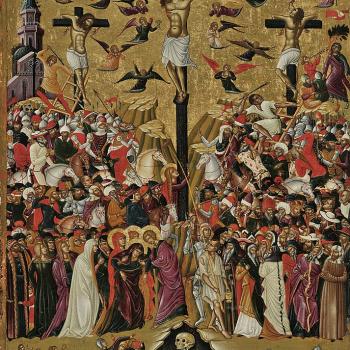
Pope Francis frequently shares his love to those who have otherwise been mistreated and abused by Christians. This is revealed in in the relationship he has developed with many poor trans women in Italy. They have come to know him and his welcoming love; he offers them help with their material needs, even as he encourages them to listen to him every month at one of his general audiences, giving them a special space when they come. He, of course, offers similar love to others, from the homeless living in Rome, to those in prison, showing how all of them are loved, not just by him, but by God. In doing so, he is demonstrates to all Catholics, indeed, all Christians, what they should be doing.
Pope Francis, because of his loving engagement with those who have been disenfranchised, not only by society, but by Christianity, has had many Christians question him and his integrity. They act like he is undermining the faith by sharing such bountiful love to sinners. The problem is that they have not listened to Christ themselves, for if they did, they would know the primary exhortation Christ gave was to love. Instead of listening to Christ, and seeing Christianity as a religion of love, where everything is judged and guided by love, they want to turn Christianity into an ideology, using some (but not all) of its teachings as a way to judge and condemn those who do not follow their own ideological bent (including the Pope). They show us that they do not want to follow Christ who said we should love our neighbor; instead, they want to oppress their neighbor, and use some aspect of Christian teaching to do so, making for a false presentation of Christianity. They pretend to be following the truth, but they do is take some element of the truth out of its proper context, turning it into a falsehood (which is the way heresies develop).
Love is fundamental to the Christian faith. Our engagement of the other should be based upon love. Only when we engage love do we find ourselves truly turning away from sin and towards God. “Let us possess such great charity, brethren, that we can love all men with our whole hearts. If you love all mankind as yourself, there will not remain a door whereby sin can enter into you.”[1] Any morality without love is a false morality. “All the good works which a man has performed will be in vain if he does not possess a genuine charity which he extends to his enemies as well as to his friends.” [2] And, as we are to love our neighbor as ourselves, we should be concerned about the needs of our neighbor; if we find them being unjustly oppressed or impoverished, we should do what we can to help them, just as we would wish people would help us if we were in such a situation. This means, as we work to remove the structures which cause their oppression, we must also deal with their immediate needs, making sure they have the resources they need not only to survive, but to thrive. If we do so, we will find our actions please God, because we will be acting like God:
Toward the poor also and those handicapped by various disabilities, let a kinder generosity be held out, that gratitude might be rendered to the “grace of God” by the voices “of many,” and that they needy might obtain refreshment by our fasts. God is pleased by no devotion of the faithful more than what is spent on the poor, and where he finds “merciful” care, there he recognizes the likeness of his own holiness. [3]
God is love; we reveal the image of God given to us when we engage others with love. God’s love is for everyone. Nonetheless, not everyone has the same needs. Not everyone is in the same dire situation. Just as a father or mother will take special care when one of their children is sick, so God provides special care for those who need the most help:
God’s special solicitous attention is directed toward the weak and the poor. Memory of the fact that Israel itself was poor in Egypt (Exod 22:20; Deut 10:19; 24:22) and that God led his people out of Egypt with his mighty arm and saved them (Exod 6:6; Deut 5:15) continues to have an effect. In the promised land, God’s special love and care were applied to the poor and the weak. It is especially evident in the command not to oppress the poor or exploit aliens, widows, and orphans (Exod 22:20-26); it is also evident in the protection of the poor in court (Exod 23:6-8) and in the prohibition of usuary (Exod 22:24-26). The Book of Leviticus knows a distinctive social legislation (Lev 19:11 -18; 25). With God the normal social hierarchy is virtually inverted.[4]
This special, preferential care for the poor and the oppressed, does not mean God ignores the needs of everyone else, and does not really love them. God is love, and God’s love is universal, but that universal care is applied in particular situations and contexts, doing what is best for all involved. The poor, the oppressed, those dehumanized by society, are the ones in the greatest need, and so they are the ones who have the most to gain.
We have been warned, ignoring the plight of the poor, ignoring their distress, ignoring the way they have been dehumanized by giving some sort of excuse to justify our inaction (“they are sinners”), we will find ourselves judged by God in accordance to the way we have treated them:
Before the tribunal of the eternal Judge a man will appear guilty of as many murders as the number of poor people who have died of hunger where he lived, because he refused to pay tithes, for he reserves for his own use the possessions assigned to the poor by our Lord. Therefore, if a man wishes to obtain a reward and to merit the forgiveness of his sins, he should be eager to pay tithes and to give alms even from the remaining nine-tenths. [5]
We should love all. We should do what we can for those in need, for that is what God has done for us. Because our sins made us spiritually impoverished, God came to us to make us rich through grace. Throughout his life, Jesus showed us that God truly cares for humanity, that God was willing to go to those whom society and religious leaders denounced as sinners unworthy of consideration, and show them the love and grace which they had been unjustly denied. Jesus revealed to us what it is to love. Because his actions served as a challenge to their authority, many secular and religious authorities despised Jesus for what he said and did and wanted him dead. This, likewise, is why so many hate Pope Francis: he follows the example Christ has given; he loves those whom various religious leaders have declared to be sinners unworthy of love. Pope Francis puts the Christian message in action. This message is not “go, look for sinners, judge and condemn them, making their lives miserable as a form of social coercion.” Rather, it is simply to love our neighbor and so make things better for them, especially those who are oppressed or cut off from society. He lives the message, and in doing so, shows himself to be a great Christian teacher, fulfilling what is expected of him in his role as Pope:
For if anyone shows his neighbors the examples of good actions and turns them back to imitating the works of almsgiving or hospitality or of the other virtues which they had neglected, even though his tongue be silent, he actually executes the office of teacher and obtains from the devoted judge a sure reward in return for the salvation of his brother whom he has corrected.[6]
Pope Franics is not virtue signaling when he cares for those in need. He loves them, and they know it. He treats them with respect. It is not done for show; those who are on the receiving end of such charity can tell the difference between fake charity and love and the real thing. This is not to say Pope Franics is perfect, but in regards the way he takes care of those on the streets, those who are often treated by Christians as contemptible and so neglected, his love is genuine and it is because it is genuine, he is truly teaching us what we should be like as well.
[1] St. Caesarius of Arles, Sermons Volume I (1-80). Trans. Mary Magdeleine Mueller, OSF (New York: Fathers of the Church, 1956), 146 [Sermon 29].
[2] St. Caesarius of Arles, Sermons Volume I, 196 [Sermon 39].
[3] St Leo the Great, Sermons. Trans. Jane Patricia Freeland CSJB and Agnes Josephine Conway SSJ (Washington, DC: CUA Press, 1996), 208 [Sermon 48].
[4] Walter Kasper, Mercy. Trans. William Madges (New York: Paulist Press, 2013), 56.
[5] St. Caesarius of Arles, Sermons Volume I, 166 [Sermon 33].
[6] Venerable Bede, “Commentary on James” in Commentary on the Seven Catholic Epistles. Trans. Dom. David Hurst, OSB (Kalamazoo, MI: Cistercian Publications, 1985), 65.
Stay in touch! Like A Little Bit of Nothing on Facebook.
If you liked what you read, please consider sharing it with your friends and family!
N.B.: While I read comments to moderate them, I rarely respond to them. If I don’t respond to your comment directly, don’t assume I am unthankful for it. I appreciate it. But I want readers to feel free to ask questions, and hopefully, dialogue with each other. I have shared what I wanted to say, though some responses will get a brief reply by me, or, if I find it interesting and something I can engage fully, as the foundation for another post. I have had many posts inspired or improved upon thanks to my readers.

















